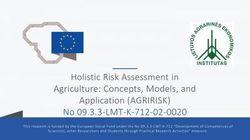
Holistic Risk Assessment in Agriculture: Concepts, Models, and Application (AGRIRISK)
No 09.3.3-LMT-K-712-02-0020
The purpose of this post-doctoral fellowship research is to analyse the concept and models of risk management in agriculture, and based on the holistic paradigm, to formulate a comprehensive risk management model for agriculture.
Risk management strategies in today’s information age should be developed with holistic, broad views of business operations, which allow the integration of different risks types and their interaction effects on the management of agricultural activities. In fact, the landscape of business risk in the information age, unlike in the past, now requires that every new strategic initiative consider and mitigate the possibility of multi-dimensional risk potentials to agriculture. Therefore, complex risk management helps simultaneously identify the threats posed by several risks, which increases the efficiency of the economic decisions that are made. The integrated risk management perspective provides a framework for identifying and assessing the many types of uncertainties relevant to business strategy in agriculture formulation. A holistic approach to the problem makes it possible to achieve synergies in order to achieve a more valued solution and engage all stakeholders who are affected by agricultural risks and who take actions to manage them; consider the full range of risks; analyse different strategies to manage risk; and understand the different steps in the risk management process. Agricultural risk management is an issue of development effectiveness, not just a matter of kindness to farmers. The increasing presence of risk in the agricultural sector may not just exacerbate volatility, but may also become a major impediment to development, economic growth, and poverty reduction agendas.
Fellowship supervisor - Dr Tomas Baležentis
Research fellow - Dr Lina Novickytė
Duration: December 1, 2017 - November 30, 2019.
This research is funded by the European Social Fund under the No 09.3.3-LMT-K-712 “Development of Competences of Scientists, other Researchers and Students through Practical Research Activities” measure.
